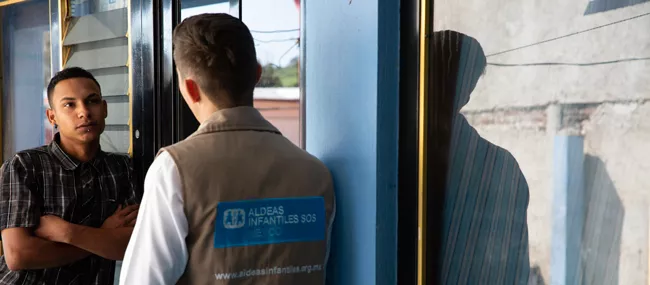Young migrant pursues safety and a new life
Yusad* (18) likes to write. He says his first notebook, where he wrote about his two-month journey to Mexico, got ruined in the rain, but he just bought a new one.
He likes writing stories of when he left his country, he says it helps him process all his experiences and it is a way of expressing himself.
“I write about how I got here, all that I suffered,” says Yusad. “I braved hunger, thirst, humiliation. I saw many things, but I had to keep going and overcome them to achieve my goals.”
He does not like to talk about why he left his home country but admits that if he had stayed, he would have lost his way.
Yusad describes himself as a brave person for all that he has been through, but he does not hesitate to admit that the hardest part is to be away from his family, especially his mother.

Humanitarian response
UNICEF says there are currently nine times more unaccompanied migrant children in Mexico since the beginning of 2021. Today, approximately 275 additional children find themselves in Mexico every day, after being detected by the Mexican authorities.
Victims of gang violence and extortion, Honduran families choose to send their children abroad. Many times, they take this long journey to Mexico or the US to save their lives.
But as one of the most dangerous routes in the world, children still face life-threatening perils such as scams, assault, and violence.
Even if they make it through, migrants can be exposed to various stress factors that influence their mental health and psychosocial wellbeing.

Ángel Sánchez, SOS youth advisor and psychologist, says that when unaccompanied migrant minors arrive in Mexico, most of them have suffered traumatic experiences that lead to low self-esteem and insecurity, which does not allow them to plan their future and their next steps.
"Most of the emotional and mental anguish is directly related to current stress, worries, and uncertainty about the future," says Sánchez. "Also, experiences in their home country or during their journey."
SOS Children’s Villages Mexico offers temporary shelter to migrant unaccompanied minors while providing psychosocial support to work on resilience and emotional recovery.
Likewise, young men and women work on a life development plan with an SOS youth advisor, according to their needs and wishes. Many times, this entails continuing their education, entering the labour market or professional training.
SOS Children’s Villages Mexico also supports children to obtain refugee status so they have access to basic services, such as health care and education.
Integration into the community
Yusad walks around the city centre with his two friends, Monica and Kenny, while they try each other’s ice cream and make jokes.
The two young men stop to look at a blue cardigan for 20 pesos (approximately $1.20 CAD) and after trying it on, they both buy one for each other. Monica jokes that they will look like twins.
The three Hondurans only met eight months ago at the SOS Children’s Village but it seems that they have known each other for ages.

Although they all now live in different places, they stay in touch and see each other frequently.
“My friends are like my brother and sister because I have no family here,” he says. “We have been through thick and thin together; we have seen each other cry and laugh and cheer each other up.”
Yusad recently moved to a room in the city, where SOS Children’s Villages in Mexico supports him with rent. Likewise, he speaks with SOS Youth Advisor Angel to talk about his plans, current challenges, and needs.
He also received his refugee status in the country and now works at a shop that makes truck tarps, where he has learned to weld and make vinyl designs for cars.
Yusad is an avid learner and hard worker. His wish is that one day he will open his own workshop.
“I send a little money to my mother, it is not much, but it is something and she is proud of me,” he says. “Someday I will see her and give her a kiss, and a hug because it’s going to be a year that I haven't looked at her, hugged or kissed her.”
*Name changed to protect participants’ privacy
